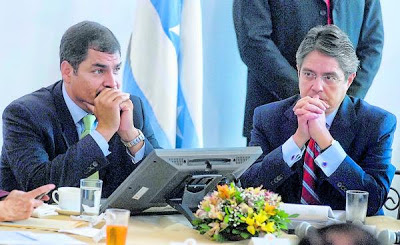
14ymedio, Carlos Alberto Montaner, 11 March 2017 — They are five: Cuba, Venezuela, Bolivia, Nicaragua and Ecuador. That’s the main nucleus of the 21st-Century Socialism countries. They have different economic structures and their governments manage the productive apparatus in diverse ways, but their rulers coincide on an essential aspect: they attained power so they could keep it permanently. Alternation in the tasks of governance seems to them a bourgeois foolishness to which they’re not willing to submit, even if they have to twist the laws or commit some form of fraud.
The Cuban dictatorship, which 58 years ago seized the country at gunpoint, declared in its Constitution that the Communist Party is the only institution permanently authorized to organize society — period. There is nothing to debate. Any vestige of pluralism is illegal and those who express their disconformity with that unnatural uniformity are worms at the service of imperialism who can — and should — be extirpated. That’s why they murdered Oswaldo Payá.
The other four countries, obligated by the peaceful and electoral manner in which they acceded governance, pretend to be liberal democracies with freedoms, separation of powers and periodic elections. But they don’t believe in those elements either, and are willing to turn a blind eye to these minor “formalities” or to convert the institutions of democracy into instruments of tyranny.
That’s what just happened in Ecuador. The first unsavory trick was to set the majority at 40 percent of the vote. They did that to adapt the balloting to the ceiling of the party in power and not to take a chance on a second round or runoff. Unless Pythagoras was pulling our leg, a majority is one-half-plus-one of the votes cast. Anything that disagrees with that way of counting is a subterfuge counter to decency and common sense.
But, because resistance to Rafael Correa is in crescendo, because more than half of the country is tired of his bullying, and because Ecuador’s economic situation gets worse each passing day as a consequence of the corruption and the exponential increase in public spending, it became evident that the government would not garner 40 percent of the vote, which meant that there would be a second round.
It was at that point that Rafael Correa and his Defense minister, Ricardo Patiño (Cuba’s man), decided to alter the results to exceed the dishonest percentage of 40. To that end, they took best advantage of their revolutionary rhetoric. The value of the Revolution and the glorious destiny of the socialist motherland rose above the petty will of a temporary majority that, in the future, would be grateful to them. How important was to alter a few tenths of a percentage when the fate of the Revolution was at stake?
Fortunately, they could not perpetrate their plans thanks to the vigilance of Gen. Luis Castro Ayala, inasmuch as the Constitution makes the Armed Forces the guarantors of any election. When the so-called “chain of custody” was lost (the transfer of votes to the National Electoral Council), the general realized that fraud was in the making, refused to be complicit to that shameful act and stood up to the plotters.
Castro Ayala saved the people’s will and went into history as a man of honor, but lost his post. Correa — despite alleging his friendship with the general and proclaiming, with some cynicism, his “deep sorrow” over his action — called for his resignation and placed at the head of the Armed Forces some officers who responded to his ideological line, which is also Patiño’s.
The Ecuadoreans will return to the ballot boxes. To win, and to make sure the election is not taken from them, they must count on two basic factors. First is the unequivocal and enthusiastic support of all democrats to the candidacy of opposition candidate Guillermo Lasso. Second is their willingness to defend their votes tooth and nail because 21st-Century Socialism is capable of any foul trick to cling to power.
One final and melancholy observation. Those socialists — who are totally unlike European social-democrats — are willing to commit any abuse in order to prevail. If they do prevail by hook or crook, they will speed their race toward tyranny, as happened in Maduro’s Venezuela. The Ecuadoreans are not just betting on a change of government; they’re gambling on their very freedom. In that country, democracy has an expiration date: April 2. After that date, night might fall forever.
Note: English translation from Montaner’s blog.
